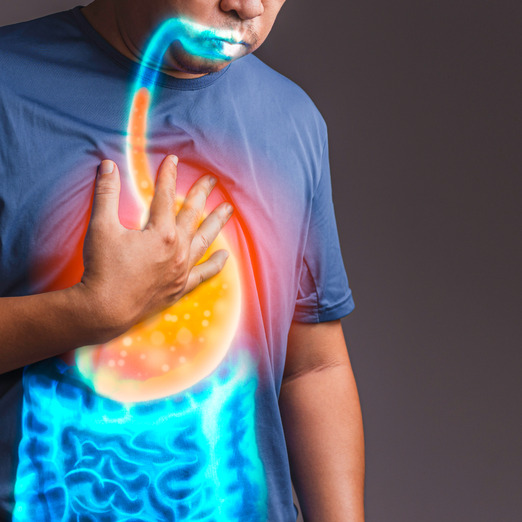
Gastroesophageal reflux disease (GERD)
Everything you need to know about gastroesophageal reflux disease
Gastro-oesophageal reflux disease (GERD) is a disease that affects many people worldwide.
It manifests itself by the backflow of stomach contents into the oesophagus, which is not only unpleasant but can also be potentially damaging to the oesophageal mucosa.
In this comprehensive blog post, you will learn everything there is to know about this widespread condition - from the symptoms and causes to the latest treatment options.
Symptoms of gastroesophageal reflux disease
The symptoms of gastro-oesophageal reflux disease are varied, but there are some classic signs that you should look out for .
The most well-known symptom is certainly heartburn, a burning sensation behind the breastbone that often occurs after eating and can spread to the throat. Other common symptoms include:
- Belching of acidic stomach contents
- Difficulty swallowing
- Chronic cough
- Hoarseness in the morning
- A feeling as if there is a lump in the throat
- Tooth erosion due to the acidic stomach contents
If you regularly experience any of these symptoms, it is advisable to consult a doctor.
Causes and risk factors
The cause of gastro-oesophageal reflux disease lies in a dysfunction of the lower oesophageal sphincter.
This muscle ring at the transition from the oesophagus to the stomach normally serves as a barrier to prevent stomach contents from returning to the oesophagus. In GERD, this mechanism does not work properly.
Risk factors that can lead to weakening or dysfunction of the lower oesophageal sphincter include:
- Being overweight
- Smoking
- High alcohol consumption
- Pregnancy
- High amounts of caffeine or fatty foods
- Certain medications, such as muscle relaxants
Diagnosis
To make a diagnosis of gastroesophageal reflux disease , your doctor will first take a thorough medical history to record your symptoms and lifestyle habits. Further diagnostic measures may include:
- A gastroscopy, which uses an endoscope to examine the oesophagus and stomach
- A 24-hour pH-metry, in which the acidity in the oesophagus is measured over 24 hours
- Manometry to analyse the pressure conditions and movements in the oesophagus
Treatment options
The treatment of gastroesophageal reflux disease aims to alleviate the symptoms and prevent possible damage to the oesophagus. Various approaches are available for this purpose:
Lifestyle changes
Often, even simple lifestyle changes can bring significant relief from symptoms. These include:
- Weight reduction if you are overweight
- Avoiding foods that can trigger reflux symptoms (e.g. fatty foods, caffeine, alcohol)
- Eating smaller meals throughout the day
- Do not eat shortly before going to bed
- Sleeping with your upper body elevated
Medication
There are various medications that can be used to treat GERD, including:
- Antacids, which help to neutralise stomach acid
- H2 blockers and proton pump inhibitors (PPIs), which reduce the production of stomach acid
- Prokinetics, which accelerate gastric emptying and can increase the pressure in the lower oesophageal sphincter
Surgical options
In severe cases or if other treatment methods are not effective, surgical correction may be considered.
The most commonly performed operation is the so-called fundoplication, in which the upper part of the stomach is wrapped around the lower part of the oesophagus to strengthen the oesophageal sphincter.
Prevention
Although it is not always possible to completely prevent gastro-oesophageal reflux disease, some measures can reduce the risk of developing the disease.
These include a healthy diet, regular exercise and avoiding tobacco and excessive alcohol consumption.
Conclusion
Gastro-oesophageal reflux disease is a serious condition, but with the right measures it can be well controlled . If you suffer from the above symptoms, do not hesitate to seek medical advice. With a combination of lifestyle changes, medication and, if necessary, surgery , most people with GERD can lead a symptom-free life.
Become a member now
As a member, you will receive further information and frequencies on this topic! Log in here!
